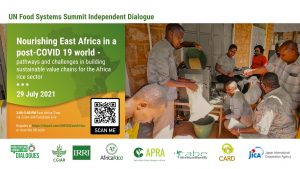Type de Concertation
Coordonnateur
Langue de l'événement de Concertation
Date/heure
À:
Cible géographique
Format
Veuillez consulter les détails ci-dessous pour obtenir des renseignements sur l’inscription, s’ils sont disponibles, ou communiquer avec le coordonnateur si vous souhaitez y assister.
Description
Co-convened by: IRRI, Africa Rice Center (AfricaRice), Agricultural Policy Research in Africa Programme of the Future Agricultures Consortium (APRA), Centre for African Bio-Entrepreneurship (CABE), Coalition for African Rice Development (CARD), Japan International Cooperation Agency (JICA)
Register at: http://tinyurl.com/UNFSSEastAfrica
Inclusive agri-food systems can reach, benefit, and empower the population, especially the socially and economically disadvantaged groups and individuals in the society, both producers and consumers, helping to contribute to multiple UN Sustainable Development Goals.
An inclusive value chain approach can emphasize the ‘hidden middle’ of the rice value chain, including processing, distribution, and services. As rice value chains become longer and more complex in response to urban demand, there will be a critical need for ensuring food safety and quality through regulation, certification, and inspection as well as innovations for safe storage, packaging and transportation. Investing in the institutions and infrastructure needed represents a potential ‘triple win’ for job creation, consumer health, and import substitution linked to rice agri-food systems.
This Independent Food Systems Dialogue aims to bring together a range of stakeholders across the food system — from producers to value chain actors, consumers and policymakers — to respond to the challenge of building sustainable value chains for the African rice sector in a post-COVID 19 context. Specifically, the dialogue aims to address these three questions:
- How has the African rice sector responded to multiple regional and global crises, including the 2007-2008 food crisis and the current COVID-19 pandemic, and what lessons can we learn in order to build back better?
- What evidence do policymakers and multisectoral partners respond to in order to develop and implement the necessary policies and programs in response to these crises and to the surging increase in imports?
- How can we shift stakeholder perspectives towards integrating nutrition and health in agricultural activities and research?
The dialogue consists of two parts: a) an online public forum with stakeholders and experts at the regional level and b) breakout sessions where participants can discuss the guide questions noted above in-depth.


